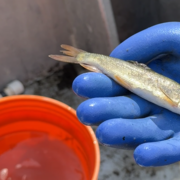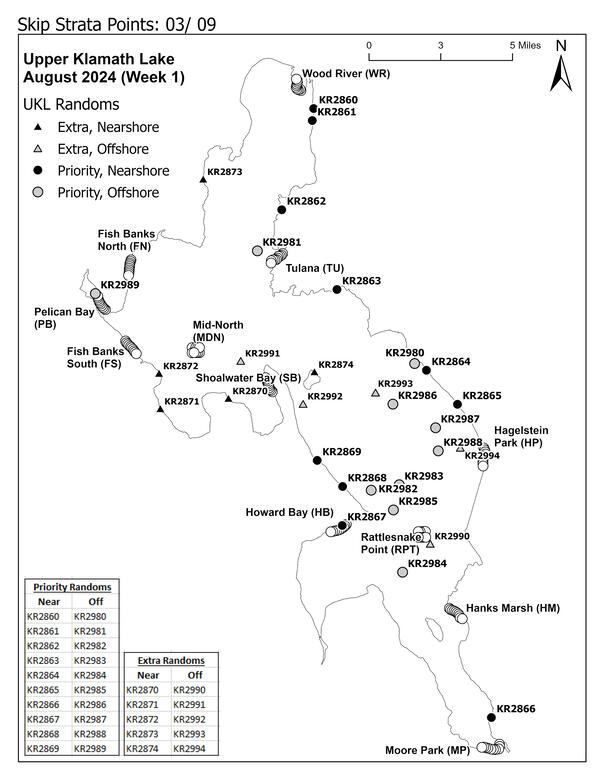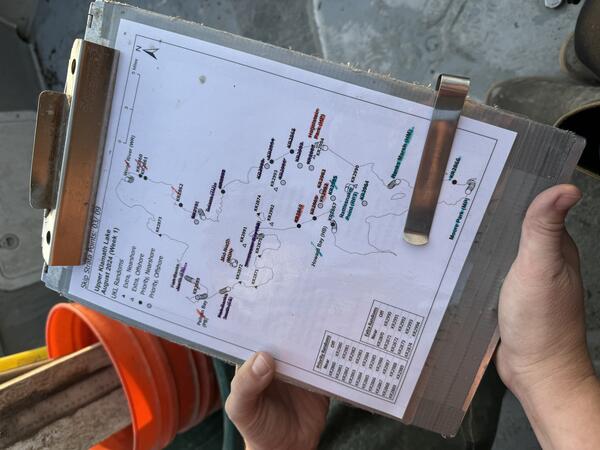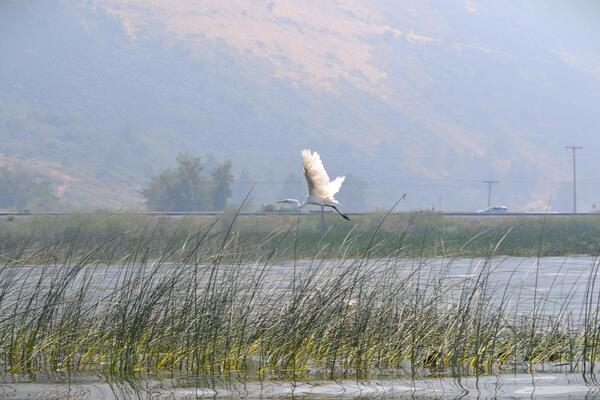This is a map of the nets on the Upper Klamath Lake in Oregon. The Western Fisheries Research Center carefully monitors juvenile Sucker populations for signs of population recovery and to better understand where they habitate.
Jacob Krause, Ph.D.
As our access to aquatic resources become increasingly complex, my research aims to provide managers with the knowledge to make wise and informed decisions. My investigations are focused on understanding fish population dynamics through field observations and robust mathematical modeling.
I work at the Klamath Falls Field Station as a Research Fish Biologist. My current work focuses on the challenges of recovering the endangered Lost River and shortnose suckers in the Upper Klamath River Basin, through monitoring their population dynamics and investigating potential barriers to recruitment. My postdoctoral studies included analyzing the effects of hypoxia on the shrimp fishery of the Gulf of Mexico, and using telemetry to estimate mortality within the cobia fishery, an important recreational species in the Southeast Atlantic. For my doctoral research project, I spent six years determining the sources, magnitude, and timing of weakfish mortality across the Atlantic Coast using telemetry, conventional tagging, and predator-prey models. I developed an Index of Biotic Integrity (IBI) for prairie streams of South Dakota for my Master’s thesis, and have been involved in coral reef monitoring on the island of Grenada, lake management plans to mitigate invasive aquatic plants in the Midwest, and maintaining Lake Michigan’s power plants’ compliance to EPA’s 316 (b) mandate.
Research interests:
I enjoy conducting applied fisheries research that informs sound management decisions. I am interested in learning about established methods used in fisheries management, such as mark-recapture and population indices, and am always keen to improve on existing knowledge. I frequently work with collaborators across multiple institutions to address topics of interest in both marine and freshwater environments.
My skillset includes using telemetry, conventional tagging, experimental research designs, and interpreting long-term monitoring data, to better understand the abiotic and biotic barriers to fish population recovery. In addition to traditional field observations, I am experienced in quantitative analysis, including hierarchical models across multiple statistical frameworks, mark-recapture, predator-prey interactions, simulations, and writing R code.
Professional Experience
2021 to Present – Research Fish Biologist, U.S. Geological Survey, Western Fisheries Research Center, Klamath Falls, OR
2020 – 2021 - Fish Biologist, U.S. Geological Survey, Western Fisheries Research Center, Klamath Falls, OR
2019 – 2020 - NRC Postdoctoral Researcher, NOAA Fisheries Science Center, Beaufort, NC
2019 – Postdoctoral Researcher, North Carolina State University, Morehead City, NC
2013 – 2019 – Doctoral student, North Carolina State University, Morehead City, NC
2013 – Biological Science Technician, Contractor for U.S. Fish and Wildlife Service, Milwaukee, WI
2010 – 2013 – Graduate Student, South Dakota State University, Brookings, SD
2000 – 2010 – General Worker, Smokey’s Bait Shop, Pewaukee, WI
Education and Certifications
Ph.D. 2019. Fisheries, Wildlife, and Conservation Biology, North Carolina State University, Raleigh, NC
M.Sc. 2013. Wildlife and Fisheries Sciences, South Dakota State University, Brookings, SD
B.Sc. 2009. Biology, Wisconsin Lutheran College, Milwaukee, WI
Science and Products
The Science of Suckers: What’s driving population declines in the Klamath River basin?
PIT Tags Encountered by Klamath Falls Field Station Equipment in the Upper Klamath Basin 1993-2025 (ver. 6.0, September 2025) PIT Tags Encountered by Klamath Falls Field Station Equipment in the Upper Klamath Basin 1993-2025 (ver. 6.0, September 2025)
Status and trends of adult Lost River (Deltistes luxatus) and shortnose (Chasmistes brevirostris) sucker populations in Upper Klamath Lake, Oregon, 2025 (ver. 3.0, July 2025) Status and trends of adult Lost River (Deltistes luxatus) and shortnose (Chasmistes brevirostris) sucker populations in Upper Klamath Lake, Oregon, 2025 (ver. 3.0, July 2025)
PIT Tags Encountered by Klamath Falls Field Station Equipment in the Upper Klamath Basin 1993-2025 (ver. 5.0, March 2025) PIT Tags Encountered by Klamath Falls Field Station Equipment in the Upper Klamath Basin 1993-2025 (ver. 5.0, March 2025)
Status and trends of adult Lost River (Deltistes luxatus) and shortnose (Chasmistes brevirostris) sucker populations in Upper Klamath Lake, Oregon, 2024 (ver. 2.0, October 2024) Status and trends of adult Lost River (Deltistes luxatus) and shortnose (Chasmistes brevirostris) sucker populations in Upper Klamath Lake, Oregon, 2024 (ver. 2.0, October 2024)
Analysis of fish PIT tag detections from 2008-2024 at the Link River Dam fish ladder in the Upper Klamath River Basin, Oregon Analysis of fish PIT tag detections from 2008-2024 at the Link River Dam fish ladder in the Upper Klamath River Basin, Oregon
PIT Tags Encountered by Klamath Falls Field Station Equipment in the Upper Klamath Basin 1993-2024 (ver. 4.0, August 2024) PIT Tags Encountered by Klamath Falls Field Station Equipment in the Upper Klamath Basin 1993-2024 (ver. 4.0, August 2024)
PIT Tags Encountered by Klamath Falls Field Station Equipment in the Upper Klamath Basin 1993-2024 (ver. 3.0, April 2024) PIT Tags Encountered by Klamath Falls Field Station Equipment in the Upper Klamath Basin 1993-2024 (ver. 3.0, April 2024)
Status and trends of adult Lost River (Deltistes luxatus) and shortnose (Chasmistes brevirostris) sucker populations in Upper Klamath Lake, Oregon, 2023 Status and trends of adult Lost River (Deltistes luxatus) and shortnose (Chasmistes brevirostris) sucker populations in Upper Klamath Lake, Oregon, 2023
PIT Tags Encountered by Klamath Falls Field Station Equipment in the Upper Klamath Basin 1993-2023 (ver. 2.0, August 2023) PIT Tags Encountered by Klamath Falls Field Station Equipment in the Upper Klamath Basin 1993-2023 (ver. 2.0, August 2023)
Detections, Physical Captures, Water Quality, and Fish Health associated with Endangered Suckers in Three Net Pens in Upper Klamath Lake, 2020 Detections, Physical Captures, Water Quality, and Fish Health associated with Endangered Suckers in Three Net Pens in Upper Klamath Lake, 2020
PIT Tags Encountered by Klamath Falls Field Station Equipment in the Upper Klamath Basin PIT Tags Encountered by Klamath Falls Field Station Equipment in the Upper Klamath Basin
Data from 2022 Mark-Recapture Analysis on Water and Endangered Fish in the Klamath River Basin: Do Upper Klamath Surface Elevation and Water Quality Affect Adult Lost River and Shortnose Sucker survival? Data from 2022 Mark-Recapture Analysis on Water and Endangered Fish in the Klamath River Basin: Do Upper Klamath Surface Elevation and Water Quality Affect Adult Lost River and Shortnose Sucker survival?
This is a map of the nets on the Upper Klamath Lake in Oregon. The Western Fisheries Research Center carefully monitors juvenile Sucker populations for signs of population recovery and to better understand where they habitate.
This is a map of the nets on the Upper Klamath Lake in Oregon. The Western Fisheries Research Center carefully monitors juvenile Sucker populations for signs of population recovery and to better understand where they habitate.
This is a map of the nets on the Upper Klamath Lake in Oregon. The Western Fisheries Research Center carefully monitors juvenile Sucker populations for signs of population recovery and to better understand where they habitate.
This is a photo of the endangered Klamath Sucker in Upper Klamath Lake, OR. Through decades of research, scientists of the USGS Western Fisheries Research Center have determined that, over the last 30 years, something has prevented young suckers from reaching adulthood.
This is a photo of the endangered Klamath Sucker in Upper Klamath Lake, OR. Through decades of research, scientists of the USGS Western Fisheries Research Center have determined that, over the last 30 years, something has prevented young suckers from reaching adulthood.
Since 2009, the WFRC has partnered with Real Time Research to study bird predation of suckers. Scientists scan large nesting sites of fish-eating (piscivorous) birds, looking for PIT tags from juvenile and adult suckers that have been eaten by the birds.
Since 2009, the WFRC has partnered with Real Time Research to study bird predation of suckers. Scientists scan large nesting sites of fish-eating (piscivorous) birds, looking for PIT tags from juvenile and adult suckers that have been eaten by the birds.
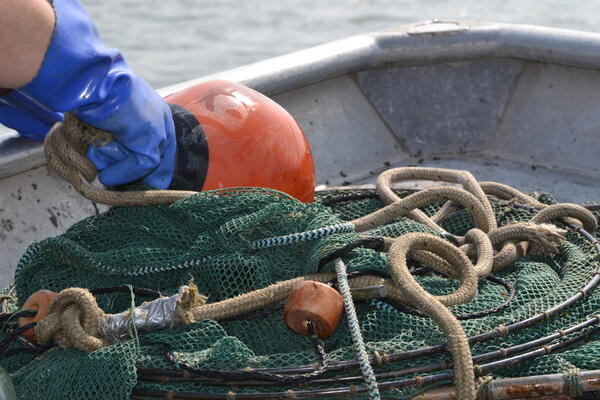
Nets Used to Sample Juvenile Suckers in Upper Klamath Lake, OR
Nets Used to Sample Juvenile Suckers in Upper Klamath Lake, ORLost River and Shortnose suckers are on the verge of extinction in Upper Klamath Lake. Age data indicate that almost all adult suckers remaining in the lake spawning populations were hatched in the early 1990s.
Nets Used to Sample Juvenile Suckers in Upper Klamath Lake, OR
Nets Used to Sample Juvenile Suckers in Upper Klamath Lake, ORLost River and Shortnose suckers are on the verge of extinction in Upper Klamath Lake. Age data indicate that almost all adult suckers remaining in the lake spawning populations were hatched in the early 1990s.
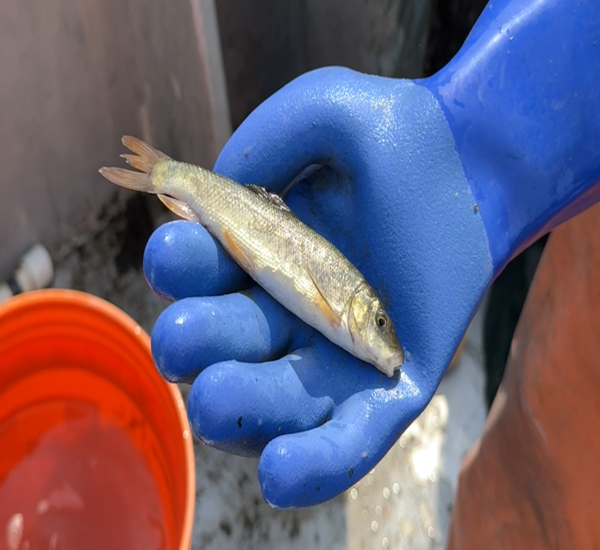 Endangered Klamath Sucker fish held in hand with glove above bucket of water
Endangered Klamath Sucker fish held in hand with glove above bucket of water
This is a video of a juvenile sucker in Upper Klamath Lake, OR. Through decades of research, scientists at the USGS Western Fisheries Research Center have determined that over the last 30 years something has prevented young suckers from reaching adulthood. Scientists work tirelessly to find the cause of this break in recruitment into adulthood.
This is a video of a juvenile sucker in Upper Klamath Lake, OR. Through decades of research, scientists at the USGS Western Fisheries Research Center have determined that over the last 30 years something has prevented young suckers from reaching adulthood. Scientists work tirelessly to find the cause of this break in recruitment into adulthood.
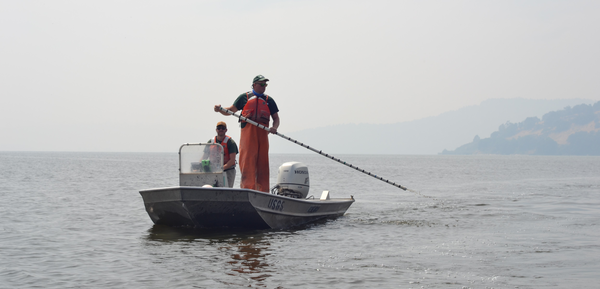 boat with USGS fisheries scientists on Upper Klamath Lake, OR
boat with USGS fisheries scientists on Upper Klamath Lake, OR
Juvenile Sucker Sampling on Upper Klamath Lake, OR
Juvenile Sucker Sampling on Upper Klamath Lake, ORThis is a video of fieldwork in Upper Klamath Lake, OR. Here, biologists sample for juvenile suckers, an endangered fish species in the lake.
Juvenile Sucker Sampling on Upper Klamath Lake, OR
Juvenile Sucker Sampling on Upper Klamath Lake, ORThis is a video of fieldwork in Upper Klamath Lake, OR. Here, biologists sample for juvenile suckers, an endangered fish species in the lake.
Effect of oxygenation and location on survival and growth of endangered Lost River Suckers in net pens Effect of oxygenation and location on survival and growth of endangered Lost River Suckers in net pens
Predation of Lost River and Shortnose suckers by piscivorous colonial waterbirds in the Upper Klamath Basin: An analysis of predation effects during 2021–2023 Predation of Lost River and Shortnose suckers by piscivorous colonial waterbirds in the Upper Klamath Basin: An analysis of predation effects during 2021–2023
Growth, survival, and cohort formation of juvenile Lost River (Deltistes luxatus) and shortnose suckers (Chasmistes brevirostris) in Upper Klamath Lake, Oregon, and Clear Lake Reservoir, California—2021–22 monitoring report Growth, survival, and cohort formation of juvenile Lost River (Deltistes luxatus) and shortnose suckers (Chasmistes brevirostris) in Upper Klamath Lake, Oregon, and Clear Lake Reservoir, California—2021–22 monitoring report
Does release size into net-pens affect survival of captively reared juvenile endangered suckers in Upper Klamath Lake? Does release size into net-pens affect survival of captively reared juvenile endangered suckers in Upper Klamath Lake?
Water and endangered fish in the Klamath River Basin: Do Upper Klamath Lake surface elevation and water quality affect adult Lost River and Shortnose Sucker survival? Water and endangered fish in the Klamath River Basin: Do Upper Klamath Lake surface elevation and water quality affect adult Lost River and Shortnose Sucker survival?
Groundwater flow model for the Little Plover River basin in Wisconsin’s Central Sands Groundwater flow model for the Little Plover River basin in Wisconsin’s Central Sands
Potential direct and indirect effects of climate change on a shallow natural lake fish assemblage Potential direct and indirect effects of climate change on a shallow natural lake fish assemblage
A generalized model for estimating the energy density of invertebrates A generalized model for estimating the energy density of invertebrates
Non-USGS Publications**
**Disclaimer: The views expressed in Non-USGS publications are those of the author and do not represent the views of the USGS, Department of the Interior, or the U.S. Government.
Science and Products
The Science of Suckers: What’s driving population declines in the Klamath River basin?
PIT Tags Encountered by Klamath Falls Field Station Equipment in the Upper Klamath Basin 1993-2025 (ver. 6.0, September 2025) PIT Tags Encountered by Klamath Falls Field Station Equipment in the Upper Klamath Basin 1993-2025 (ver. 6.0, September 2025)
Status and trends of adult Lost River (Deltistes luxatus) and shortnose (Chasmistes brevirostris) sucker populations in Upper Klamath Lake, Oregon, 2025 (ver. 3.0, July 2025) Status and trends of adult Lost River (Deltistes luxatus) and shortnose (Chasmistes brevirostris) sucker populations in Upper Klamath Lake, Oregon, 2025 (ver. 3.0, July 2025)
PIT Tags Encountered by Klamath Falls Field Station Equipment in the Upper Klamath Basin 1993-2025 (ver. 5.0, March 2025) PIT Tags Encountered by Klamath Falls Field Station Equipment in the Upper Klamath Basin 1993-2025 (ver. 5.0, March 2025)
Status and trends of adult Lost River (Deltistes luxatus) and shortnose (Chasmistes brevirostris) sucker populations in Upper Klamath Lake, Oregon, 2024 (ver. 2.0, October 2024) Status and trends of adult Lost River (Deltistes luxatus) and shortnose (Chasmistes brevirostris) sucker populations in Upper Klamath Lake, Oregon, 2024 (ver. 2.0, October 2024)
Analysis of fish PIT tag detections from 2008-2024 at the Link River Dam fish ladder in the Upper Klamath River Basin, Oregon Analysis of fish PIT tag detections from 2008-2024 at the Link River Dam fish ladder in the Upper Klamath River Basin, Oregon
PIT Tags Encountered by Klamath Falls Field Station Equipment in the Upper Klamath Basin 1993-2024 (ver. 4.0, August 2024) PIT Tags Encountered by Klamath Falls Field Station Equipment in the Upper Klamath Basin 1993-2024 (ver. 4.0, August 2024)
PIT Tags Encountered by Klamath Falls Field Station Equipment in the Upper Klamath Basin 1993-2024 (ver. 3.0, April 2024) PIT Tags Encountered by Klamath Falls Field Station Equipment in the Upper Klamath Basin 1993-2024 (ver. 3.0, April 2024)
Status and trends of adult Lost River (Deltistes luxatus) and shortnose (Chasmistes brevirostris) sucker populations in Upper Klamath Lake, Oregon, 2023 Status and trends of adult Lost River (Deltistes luxatus) and shortnose (Chasmistes brevirostris) sucker populations in Upper Klamath Lake, Oregon, 2023
PIT Tags Encountered by Klamath Falls Field Station Equipment in the Upper Klamath Basin 1993-2023 (ver. 2.0, August 2023) PIT Tags Encountered by Klamath Falls Field Station Equipment in the Upper Klamath Basin 1993-2023 (ver. 2.0, August 2023)
Detections, Physical Captures, Water Quality, and Fish Health associated with Endangered Suckers in Three Net Pens in Upper Klamath Lake, 2020 Detections, Physical Captures, Water Quality, and Fish Health associated with Endangered Suckers in Three Net Pens in Upper Klamath Lake, 2020
PIT Tags Encountered by Klamath Falls Field Station Equipment in the Upper Klamath Basin PIT Tags Encountered by Klamath Falls Field Station Equipment in the Upper Klamath Basin
Data from 2022 Mark-Recapture Analysis on Water and Endangered Fish in the Klamath River Basin: Do Upper Klamath Surface Elevation and Water Quality Affect Adult Lost River and Shortnose Sucker survival? Data from 2022 Mark-Recapture Analysis on Water and Endangered Fish in the Klamath River Basin: Do Upper Klamath Surface Elevation and Water Quality Affect Adult Lost River and Shortnose Sucker survival?
This is a map of the nets on the Upper Klamath Lake in Oregon. The Western Fisheries Research Center carefully monitors juvenile Sucker populations for signs of population recovery and to better understand where they habitate.
This is a map of the nets on the Upper Klamath Lake in Oregon. The Western Fisheries Research Center carefully monitors juvenile Sucker populations for signs of population recovery and to better understand where they habitate.
This is a map of the nets on the Upper Klamath Lake in Oregon. The Western Fisheries Research Center carefully monitors juvenile Sucker populations for signs of population recovery and to better understand where they habitate.
This is a map of the nets on the Upper Klamath Lake in Oregon. The Western Fisheries Research Center carefully monitors juvenile Sucker populations for signs of population recovery and to better understand where they habitate.
This is a photo of the endangered Klamath Sucker in Upper Klamath Lake, OR. Through decades of research, scientists of the USGS Western Fisheries Research Center have determined that, over the last 30 years, something has prevented young suckers from reaching adulthood.
This is a photo of the endangered Klamath Sucker in Upper Klamath Lake, OR. Through decades of research, scientists of the USGS Western Fisheries Research Center have determined that, over the last 30 years, something has prevented young suckers from reaching adulthood.
Since 2009, the WFRC has partnered with Real Time Research to study bird predation of suckers. Scientists scan large nesting sites of fish-eating (piscivorous) birds, looking for PIT tags from juvenile and adult suckers that have been eaten by the birds.
Since 2009, the WFRC has partnered with Real Time Research to study bird predation of suckers. Scientists scan large nesting sites of fish-eating (piscivorous) birds, looking for PIT tags from juvenile and adult suckers that have been eaten by the birds.

Nets Used to Sample Juvenile Suckers in Upper Klamath Lake, OR
Nets Used to Sample Juvenile Suckers in Upper Klamath Lake, ORLost River and Shortnose suckers are on the verge of extinction in Upper Klamath Lake. Age data indicate that almost all adult suckers remaining in the lake spawning populations were hatched in the early 1990s.
Nets Used to Sample Juvenile Suckers in Upper Klamath Lake, OR
Nets Used to Sample Juvenile Suckers in Upper Klamath Lake, ORLost River and Shortnose suckers are on the verge of extinction in Upper Klamath Lake. Age data indicate that almost all adult suckers remaining in the lake spawning populations were hatched in the early 1990s.
 Endangered Klamath Sucker fish held in hand with glove above bucket of water
Endangered Klamath Sucker fish held in hand with glove above bucket of water
This is a video of a juvenile sucker in Upper Klamath Lake, OR. Through decades of research, scientists at the USGS Western Fisheries Research Center have determined that over the last 30 years something has prevented young suckers from reaching adulthood. Scientists work tirelessly to find the cause of this break in recruitment into adulthood.
This is a video of a juvenile sucker in Upper Klamath Lake, OR. Through decades of research, scientists at the USGS Western Fisheries Research Center have determined that over the last 30 years something has prevented young suckers from reaching adulthood. Scientists work tirelessly to find the cause of this break in recruitment into adulthood.
 boat with USGS fisheries scientists on Upper Klamath Lake, OR
boat with USGS fisheries scientists on Upper Klamath Lake, OR
Juvenile Sucker Sampling on Upper Klamath Lake, OR
Juvenile Sucker Sampling on Upper Klamath Lake, ORThis is a video of fieldwork in Upper Klamath Lake, OR. Here, biologists sample for juvenile suckers, an endangered fish species in the lake.
Juvenile Sucker Sampling on Upper Klamath Lake, OR
Juvenile Sucker Sampling on Upper Klamath Lake, ORThis is a video of fieldwork in Upper Klamath Lake, OR. Here, biologists sample for juvenile suckers, an endangered fish species in the lake.
Effect of oxygenation and location on survival and growth of endangered Lost River Suckers in net pens Effect of oxygenation and location on survival and growth of endangered Lost River Suckers in net pens
Predation of Lost River and Shortnose suckers by piscivorous colonial waterbirds in the Upper Klamath Basin: An analysis of predation effects during 2021–2023 Predation of Lost River and Shortnose suckers by piscivorous colonial waterbirds in the Upper Klamath Basin: An analysis of predation effects during 2021–2023
Growth, survival, and cohort formation of juvenile Lost River (Deltistes luxatus) and shortnose suckers (Chasmistes brevirostris) in Upper Klamath Lake, Oregon, and Clear Lake Reservoir, California—2021–22 monitoring report Growth, survival, and cohort formation of juvenile Lost River (Deltistes luxatus) and shortnose suckers (Chasmistes brevirostris) in Upper Klamath Lake, Oregon, and Clear Lake Reservoir, California—2021–22 monitoring report
Does release size into net-pens affect survival of captively reared juvenile endangered suckers in Upper Klamath Lake? Does release size into net-pens affect survival of captively reared juvenile endangered suckers in Upper Klamath Lake?
Water and endangered fish in the Klamath River Basin: Do Upper Klamath Lake surface elevation and water quality affect adult Lost River and Shortnose Sucker survival? Water and endangered fish in the Klamath River Basin: Do Upper Klamath Lake surface elevation and water quality affect adult Lost River and Shortnose Sucker survival?
Groundwater flow model for the Little Plover River basin in Wisconsin’s Central Sands Groundwater flow model for the Little Plover River basin in Wisconsin’s Central Sands
Potential direct and indirect effects of climate change on a shallow natural lake fish assemblage Potential direct and indirect effects of climate change on a shallow natural lake fish assemblage
A generalized model for estimating the energy density of invertebrates A generalized model for estimating the energy density of invertebrates
Non-USGS Publications**
**Disclaimer: The views expressed in Non-USGS publications are those of the author and do not represent the views of the USGS, Department of the Interior, or the U.S. Government.


